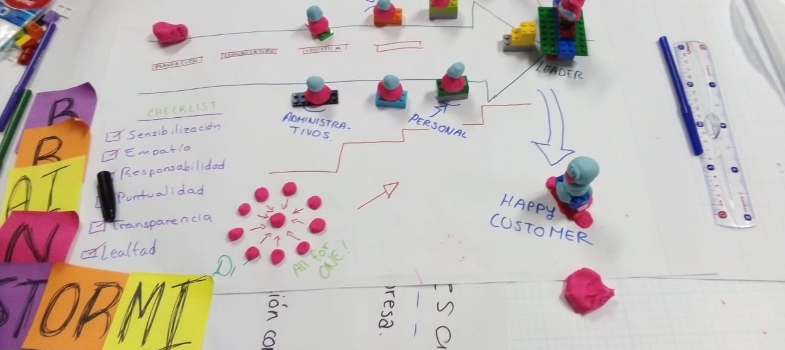Workshop activity 7: Selecting one idea
Background
Each team needs to evaluate their ideas to select the best one. Their goal is to select one (best) idea to communicate and sell to the company.
Evaluating ideas helps to clarify and even develop some promising ideas further. You might also be able to merge ideas into more compelling complete solutions. The evaluation method depends on the problem discussion and framing method the teams had used earlier on (e.g. Perspective, Prioritisation, or Mapping).
The evaluation of alternative ideas tests whether and how each idea addresses the problem. Hence, if you have explored the problem from different perspectives, then you would want to know how well each idea addresses the problem from each perspective.
What you need
Resources:
- Slide with Evaluation matrix
- Large piece of paper
- Pens
Time: 10 min
Method
Ask teams to:
Draw a matrix table (or use the 5W1H evaluation matrix).
Write or represent each individual idea on top of column.
Choose evaluation matrix from the problem discussion method you have used (or use the 5W1H evaluation matrix).
Rate your ideas from 5 (for a very good fit of idea to problem criteria) to 0 (for the least good fit of solution for problem criteria)
Calculate the sum for each column. The highest score is the best idea to take forward.
Discus in the team if the winning idea is considered the best by everyone
Example
Associated teacher activity
With your peers, go through a selection process of the ideas you came up with in the activity Workshop activity 6.
Did using this method feel as if it led to the best solution?
Advanced activity
Like the other activities, there are many ways to run a selection process. A particularly useful way of choosing one is to align it with the project or some wider learning goal. For example, the problem or learning goal might be around sustainability, hence you might wish to use some selection criteria using that as a theme, such as the Ugly Points ???
Research and identify a different evaluation framework for your student to use in your next workshop. Align your evaluation with either a project or general theme for evaluation.
Alternatively, you could create an additional activity for your student to carry out a post-workshop evaluation using a more formal method.
